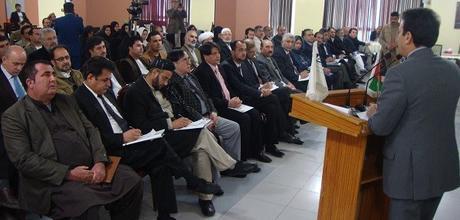
Presentation of the Herat PBA in Herat City. (Photo: CIPE Afghanistan)
In many respects, 2015 was the most significant year in Afghanistan since the beginning of the international military presence in 2001, as Afghan National Security Forces took full control of counterinsurgency operations, and the National Unity Government (NUG) of President Ashraf Ghani and CEO Abdullah Abdullah assumed power. However, the year ended on a bleak note, with civilian casualties reaching an all-time high, the Taliban regaining control of the most territory they have held since November 2001, and political infighting continuing to paralyze the NUG’s proposed economic reform program.
In November of last year, the Asia Foundation released its annual Survey of the Afghan People, which compiles the views of more than 75,000 Afghan men and women on major issues key to the country’s social, economic, and political development. The results reflect the immense levels of upheaval and change the country has gone through in the past year, with only 36.7 percent of respondents stating that they believed their country was moving in the right direction, the lowest level of optimism over the past decade.
While the increased levels of violence, and the resurgence of the Taliban and other armed opposition groups have certainly been a key contributing factor in this loss of confidence, the most frequently cited local problem among those surveyed was not insecurity, but unemployment and lack of economic opportunity.
Since the Taliban government was ousted in November 2001, Afghanistan has taken key steps in both developing its infrastructure and creating economic opportunities. Taking into account the fact that the country has effectively been in a state of conflict since the late 1970’s, the progress made is remarkable. However, much of the increased economic activity over the past 14 years has been closely tied to the international military presence and high levels of foreign development assistance. Many of the employment and business opportunities from 2001-2014 have been in large part due to various projects and contracts funded by international donors.
As the international community reduced both its military presence and financial and development assistance, Afghanistan’s economy began to slow. In the decade leading up to 2013, Afghanistan’s yearly economic growth averaged around nine percent, and stood at around 14.4 percent as recently as 2012. In 2014, this figure dropped sharply to 1.3 percent. Economic contraction has been felt most severely in areas that had a significant international military presence prior to 2014, which are for the most part outside of Kabul.
As part of its effort to help reverse this trend, CIPE has launched a program developing Provincial Business Agendas (PBAs) for four Afghan provinces that are both economic hubs and conduits for regional and international trade: Nangarhar in the east, Herat in the west, Balkh in the north, and Kandahar in the south. The PBA program takes a grassroots approach to encouraging economic growth by convening leaders of the business communities of these provinces to identify major impediments to economic development, then develop a series of policy recommendations to overcome these obstacles. These recommendations are presented to key policymakers in the form of a report, linked to further advocacy activities, calling for improvements in the legal and regulatory framework to ignite commerce, create jobs, and stimulate economic growth.
The past two months saw the successful release of PBA reports for Herat and Balkh provinces, held on November 30 and January 13 in Herat City and Mazar-e-Sharif respectively, following the release of the Nangarhar PBA report in October. In Herat, nearly 150 representatives of the business community, civil society, media, and local and provincial government institutions were in attendance, including Provincial Governor Mohammad Asif Rahimi, the heads of several key departments, including the Mastofiyat (Afghanistan’s equivalent to the Internal Revenue Service), and representatives of the Ministry of Finance.
Governor Rahimi acknowledged the important role the government can play in facilitating economic and commercial growth, stating “in concordance with the principles of the market economy, the government is obliged to provide a level playing field for all businesses and a healthy climate for the private sector to grow.” The governor additionally pledged to implement the recommendations in the PBA and promised to use his influence and position to advocate for pro-business reforms in Herat with policymakers and elected officials at the national level.
The Balkh PBA report launch was equally well-received, with over 100 individuals in attendance, including elected officials and representatives of the local and provincial governments, civil society, media, and the private sector. Key participants at the launch event included Provincial Director of Finance Mohammad Eshaq Sarwary, and economic and private sector affairs advisors to the provincial government. Like Governor Rahimi of Herat, Director Sarwary stressed the importance of encouraging private sector growth at the local level to advance economic development, and pledged to work with the business community to ensure that the PBA recommendations for Balkh province are implemented. Brishna Rabi, an MP from Balkh province, noted how Balkh functions as the “gateway” for trade between Afghanistan and Central Asia; because of this, she stressed, encouraging trade and commerce at the provincial level can have a significant impact on national growth.
After each PBA report launch, a PBA advocacy task force, consisting of key business leaders and provincial elected leaders, was established in each province to continue to support the adoption of the policy reforms outlined in each report. In Nangarhar, PBA advocacy efforts have already borne fruit, as the provincial government there took the necessary steps to provide industrial parks in Jalalabad with electricity, which was a chief concern outlined in the Nangarhar report. As reforms continue to be implemented at the local and provincial level, CIPE hopes that the grassroots approach of the PBA program will help kick-start economic growth and lay the groundwork for stability at the local and national levels.
Vivek Shivaram is Program Assistant for Afghanistan at CIPE.

